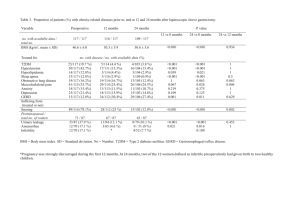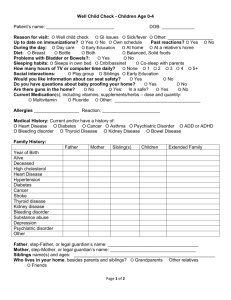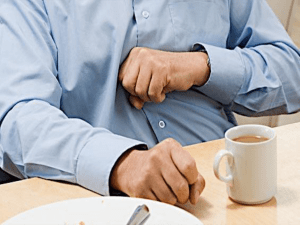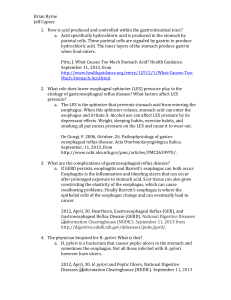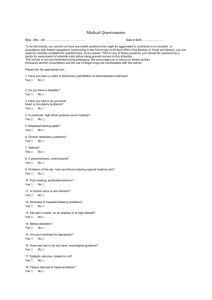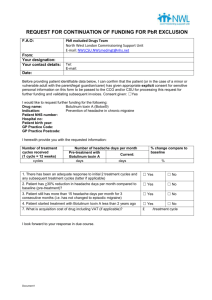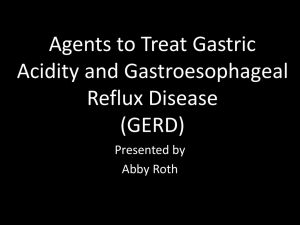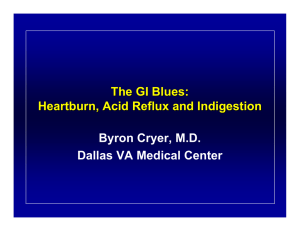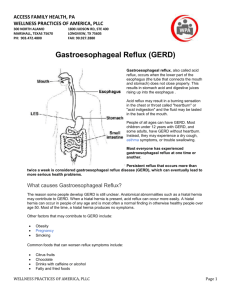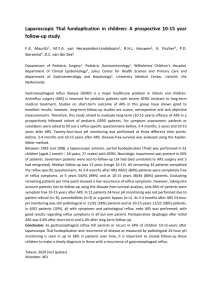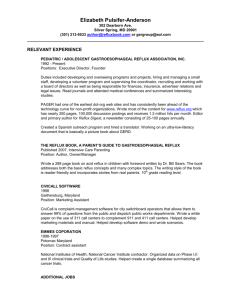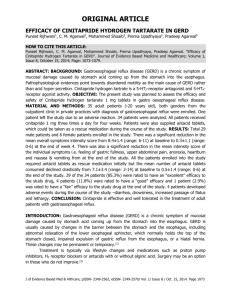file from Amy Tobolsky at Northwest
advertisement
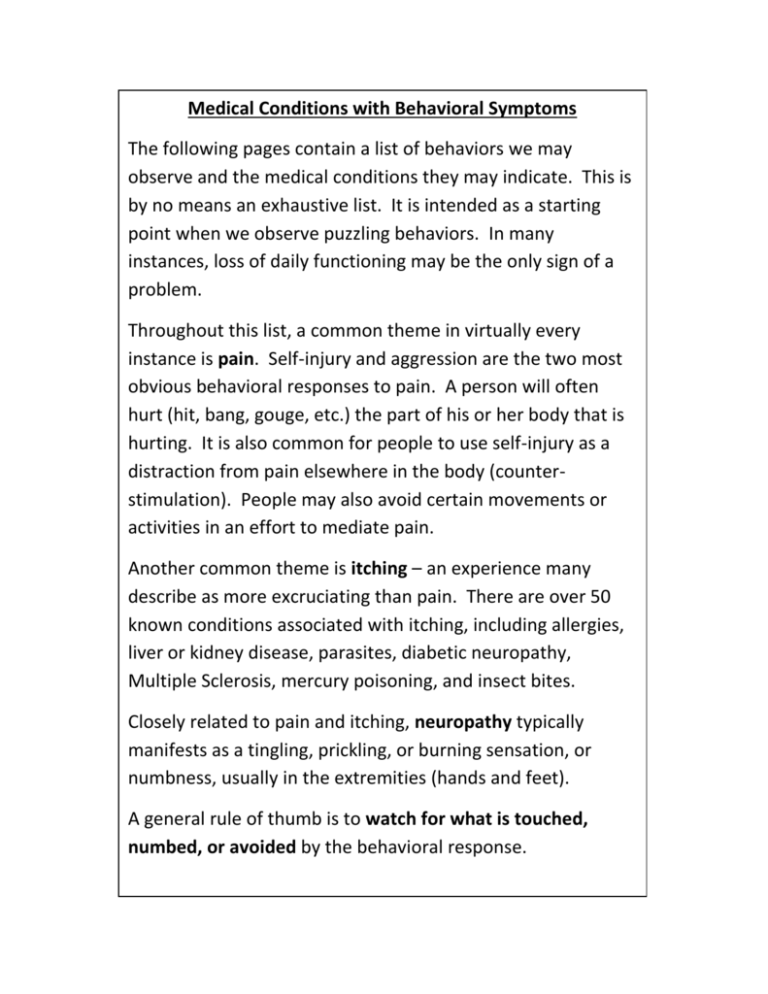
Medical Conditions with Behavioral Symptoms The following pages contain a list of behaviors we may observe and the medical conditions they may indicate. This is by no means an exhaustive list. It is intended as a starting point when we observe puzzling behaviors. In many instances, loss of daily functioning may be the only sign of a problem. Throughout this list, a common theme in virtually every instance is pain. Self-injury and aggression are the two most obvious behavioral responses to pain. A person will often hurt (hit, bang, gouge, etc.) the part of his or her body that is hurting. It is also common for people to use self-injury as a distraction from pain elsewhere in the body (counterstimulation). People may also avoid certain movements or activities in an effort to mediate pain. Another common theme is itching – an experience many describe as more excruciating than pain. There are over 50 known conditions associated with itching, including allergies, liver or kidney disease, parasites, diabetic neuropathy, Multiple Sclerosis, mercury poisoning, and insect bites. Closely related to pain and itching, neuropathy typically manifests as a tingling, prickling, or burning sensation, or numbness, usually in the extremities (hands and feet). A general rule of thumb is to watch for what is touched, numbed, or avoided by the behavioral response. IF YOU SEE BEHAVIORS RELATED TO…. High pain tolerance Sensory Avoidance: Light Sensitivity IT MIGHT MEAN… A lot of experience with pain Delirium Neuropathy Damage / disease of the eye Migraine headache Meningitis Sound Sensitivity Damage to inner ear Bell’s Palsy Lyme Disease Migraine headache Meniere’s Disease Temporomandibular Joint Dysfunction (TMJ) Depression Sensitivity toTouch (including refusal to wear clothes / socks & shoes and refusal of ADLs such as toothbrushing, shaving, hair-combing, etc.) Diabetic Peripheral Neuropathy Migraine headache Fibromyalgia Adhesive Arachnoiditis (a type of spinal inflammation) Mouth: Fist jammed in mouth / down throat Biting side of hand w/ whole mouth Biting thumb / objects with front teeth Biting with back teeth Gait / Walking: Unusual gait Walking on toes Gastroesophageal Reflux Disease (GERD) Eruption of teeth Asthma Rumination Nausea Sore throat Sinus problems Eustacian tube / ear problems Eruption of wisdom teeth Dental problems Paresthesia / neuropathy of hand Sinus problems Eustachian tube / ear problems Dental problems Otitis (ear infection) Muscle weakness Krutzfeld-Jacob (“mad cow”) Disease Liver failure Arthritis in ankles / feet / hips / knees Tight heel cords Positional: Uneven seat or frequent changes in position Refuses / avoids sitting Sudden sitting down Stooped posture Stretched forward Movement Stimulation: Intense rocking (w/ preoccupied look) Whipping head forward Waving head side to side Waving fingers in front of eyes Hip pain Genital discomfort Rectal discomfort Akathisia Back pain Rectal discomfort Anxiety disorder Dislocation of vertebrae in neck Cardiac problems Seizures Syncope (fainting) Orthostasis (dizziness caused by standing from a seated position) Vertigo Otitis (ear infection) Muscle weakness Krutzfeld-Jacob (“mad cow”) Disease Liver failure Gastroesophageal Reflux Disease (GERD) Hip pain Visceral pain Headache Chest or abdominal pain Urinary pain or discomfort Depression Dislocation of vertebrae in neck Dental problems Declining peripheral vision Reliance on peripheral vision Pain (headache, earache, sinus pain / pressure, toothache) Migraine Cataract Seizures Corneal abrasion Itchy / irritated / inflamed eyes or eyelids Ingestion / digestion: Pica (eating non-food items) Rumination (regurgitating & re-chewing) Genital / Anal / Perineum: Odd, unpleasurable masturbation Perineal digging Rectal digging Fecal soiling / smearing Skin (scratching, rubbing, gouging/ picking): General, with rash General Stomach Cigarette butts: nicotine addiction Glass: suicidality Paint chips: lead intoxication Sticks, rocks, or other jagged objects: Endogenous opiate addiction Dirt: iron or other deficiency state Feces: PTSD, psychosis General: intestinal parasites / pinworms, iron deficiency Gastroesophageal Reflux Disease (GERD) Hiatal hernia Prostatitis (inflamed prostate gland) Urinary Tract Infection (UTI) Unrinary retention Candidas vaginitis Pinworms Erectile dysfunction Repetition phenomena related to sexual abuse / Post-traumatic Stress Disorder Prostatic hypertrophy (enlarged prostate gland, esp. common in older males) Vaginitis Vulvitis Sexually Transmitted Disease (STD) Estrogen deficiency (esp. common in perimenopausal women) Diarrhea Pinworms / Intestinal parasites Hemorrhoids Constipation / Impaction Diarrhea Genital pain / discomfort Eczema Psoriasis Dermatitis Side effect of medication Liver disorder Kidney disorder Scabies Gastritis Ulcer Pancreatitis Porphyria Gall bladder disease Chest Asthma Pneumonia Gastroesophageal Reflux Disease (GERD) Costochondritis (“Slipped Rib Syndrome”) Angina Other: Head-banging / hitting head Self-restraining / binding Hugging chest Breath-holding Hyperventilation Left-handed or fingertip handshake Speaking slowly / softly / hesitantly Pain (localized to head or as a distraction from visceral pain) Migraine Dental problems Otitis (ear infection) Mastoiditis (ear infection that has spread to the bone) Eye / Vision problems Sinus problems (allergies, infection) Tinea Capitis (ringworm of scalp) Seizures Depression* Hallucinations Pain Tic or other movement disorder Seizures Severe Sensory Integration deficits Post-Traumatic Stress Disorder (PTSD) Paresthesias (prickling, tingling, or creeping sensation on the skin) Angina Ashtma Pneumonia Gastroesophageal Reflux Disease (GERD) Costochondritis (“Slipped Rib Syndrome”) Gastro-intestinal problems Gastro-intestinal problems Pain in hands / Arthritis Frightening previous setting Fibromyalgia Abdominal adhesions Cervical spine conditions *Dr. Ruth (Ryan) Myers asserts that in people with Intellectual Disability, the most common reason for head-banging is Depression. Information provided by: Northwest Health Connections A Division of Milestone Centers, Inc. NWHC 247 Hospital Drive Warren, PA 16365 Phone: 814-728-9400 Fax: 814 728-8887 website: www.northwesthc.org
